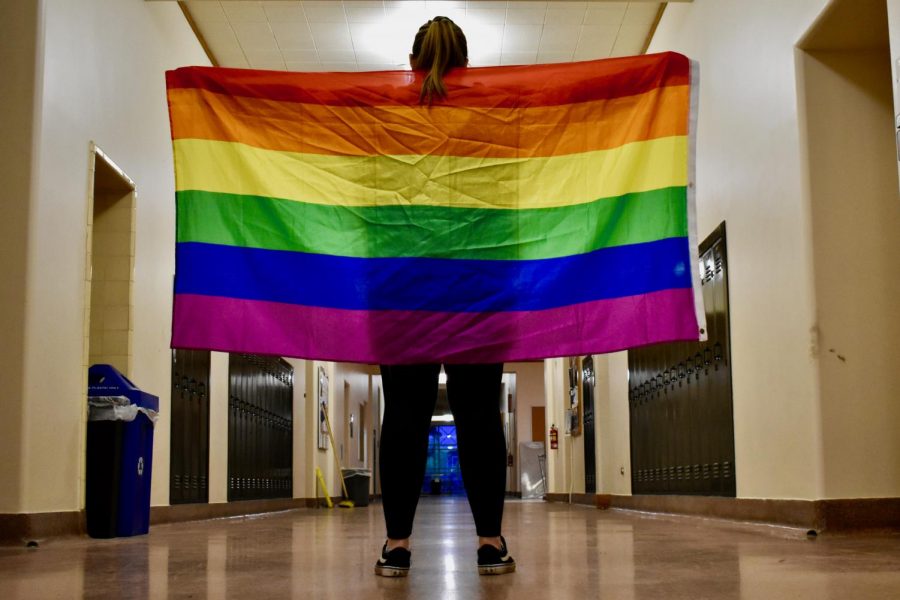Pride Week to represent all students
The colors on the pride flag are meant to reflect the diversity of the LGBTQ community. The use of the flag originated in San Francisco in 1978, but is now used worldwide.
May 22, 2019
In 1996, CWU held its first Pride Week.
Fast forward 20 years to 2016, when CWU President James L. Gaudino helped raise a rainbow flag for the first time on Barge Hall, the oldest and one of the tallest buildings on campus.
It was a symbolic gesture to assure that students of all identities can feel safe, welcomed and equal at CWU.
This year’s Pride Week will take place from May 27 to June 2. The theme of the week will be “Pride Without Borders” and will focus on two questions: what is identity and what is intersectionality?
The Pride Committee collaborated with other groups on campus like the Diversity and Equity Center (DEC), Wellness Center, Veterans Center, Apparel, Textiles and Merchandising department (ATM) and Equity and Services Council (ESC) organizations.
A series of events throughout the week will celebrate and showcase LGBTQ and other identities on campus.
An exhibit in the SURC will showcase different minority groups, such as people of color and first-generation students. It will also represent the LGBTQ in their respective communities.
Equality through Queers and Allies (EQuAL) is a CWU club that provides educational opportunities about the LGBTQ community and holds social and networking events in a safe space.
To prepare for Wildcat Statue Decoration on May 27, EQuAL members gathered in the SURC and designed quilt squares that will be sewn together to dress the Wildcat statue on the SURC East Patio.
Meghan Hoeye, secretary for EQuAL, instructed members to draw or write something that will speak to who they are in their identity. Hoeye explained that intersectionality is the idea that a person experiences more than one identity.
EQuAL members drew rainbows, hearts, quotes and other personal emblems on the fabric pieces.
Kenny Dalton is an ESC representative at EQuAL. ESC organizations promote inclusiveness and diversity on and off campus.
Dalton wrote the words, “Self Love is Radical” on his quilt piece. He explained that society puts pressure on people to fit in and to like only certain parts of their identities, which can lead them to dislike themselves.
“Liking yourself is important,” Dalton said. “Liking who you are compared to what society says who [you] should be… I’m transgender and I’m okay with that. I’m also physically disabled–I use a cane– and I’m okay with that.”
Dalton said he will take part in Pride Week as a panelist at “Queer & A: Spill the Tea,” an event where students and community members can anonymously ask any question they may have about the LGBTQ community.
“I want to encourage students who are scared to ask [and] to learn,” Dalton said. “The Q&A panel will give a foundation to learn, to be an ally in a space that’s safe and comfortable.”
Dalton will also participate in the amateur drag show and will be recognized at Lavender Graduation, along with other graduating LGBTQ Wildcats.
The amateur and professional drag shows are the most popular events of Pride Week with the biggest turnouts. It’s where drag queens and drag kings dress up, wear fancy hair and makeup and perform on stage to a cheering crowd.
Crystal Nambo is an EQuAL member who said she will be attending many of the Pride Week events, including the drag shows.
“I’m excited about seeing a whole bunch of people gather and have fun,” Nambo said.
She said it’s important to celebrate Pride Week because the LGBTQ community has overcome many things like discovering and expressing their identity and personal boundaries.
“[We’re] just saying ‘we’re here, we’re not going to hide anymore, and we’re proud of it,’” Nambo said.
Nambo drew symbols that are important to her identity on her quilt square– a graduation cap, a rainbow, a Mexican flag and a bee flying through the words ‘Bee yourself,’– of which she said, “You’re unique, you’re the only you that you’re going to be.”
Hoeye said that Pride Week is a way of telling people who are not out of the closet that there is hope and there is a safe space.
“There are more people who love you and accept you than there are people who are going to look down on you and discriminate against you,” Hoeye said.
Hoeye added that while the LGBTQ community has come a long way, there are still milestones to reach in the future.
“I would love to see more education,” Hoeye said. “The main barrier between people accepting us and people being able to come out and feel safe doing so is that people just aren’t educated on LGBT, like language and what [LGBT] even is.


